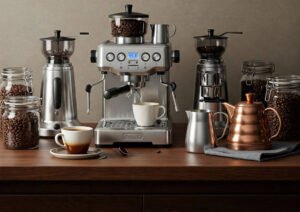Introduction to Coffee Trends
The coffee industry is a vibrant and constantly evolving field, driven by a myriad of factors that influence taste, preparation methods, and consumer preferences. As we look towards 2025, it becomes increasingly important to understand the emerging trends shaping how coffee is produced, marketed, and enjoyed. Coffee aficionados and casual drinkers alike should stay informed about these transformations in order to adapt to shifting tastes and embrace innovative brewing techniques.
One of the key elements driving coffee trends is the growing emphasis on sustainability and ethical sourcing. Consumers are becoming more discerning, opting for brands that prioritize environmentally friendly practices and fair trade principles. This shift not only affects purchasing choices but also influences how coffee is cultivated and processed. Additionally, the rise of specialty coffee has led to an increased interest in the various nuances of flavor profiles, prompting makers to experiment with different roasting methods and bean origins.
Technological advancements also play a crucial role in the evolution of coffee culture. The introduction of smart coffee machines and innovative brewing devices has revolutionized the way coffee is prepared at home and in cafes. These advancements not only enhance convenience but also allow for greater precision in brewing, thus influencing the overall taste experience. Furthermore, the digital realm is becoming an essential platform for coffee enthusiasts, providing avenues for community engagement, education, and discovery of emerging brands.
In summary, the landscape of coffee trends in 2025 is likely to reflect a blend of sustainability, technological innovation, and consumer-driven preferences. By remaining attuned to these developing trends, individuals and businesses can better navigate this rich world of coffee and appreciate its diverse offerings. Understanding these evolving dynamics helps to foster a deeper connection with the beverage that has become a staple in many cultures worldwide.
Sustainable Coffee Practices
As the global coffee industry continues to evolve, sustainability has emerged as a pivotal focus for businesses and consumers alike. Eco-friendly farming practices are becoming more prevalent, driven by an increasing awareness of environmental concerns. Farmers are adopting methods such as shade-grown coffee, which cultivates beans under a canopy of trees, thus preserving biodiversity and soil quality. This approach not only enhances the flavor profile of coffee but also supports the ecosystem.
Moreover, direct trade has gained traction as a formidable alternative to traditional trading methods. This model allows roasters to build relationships directly with coffee producers. By eliminating intermediaries, farmers are often able to negotiate better prices for their crops while consumers benefit from fresher beans. This transparency fosters a deeper connection between coffee drinkers and the sources of their beverages, enhancing consumer awareness of the social and economic implicatures of coffee agriculture.
Consumer demand for ethical sourcing has also catalyzed a greater focus on transparency. Today’s coffee enthusiasts are increasingly seeking out brands that adhere to sustainable practices. Certifications such as Fair Trade and organic have become vital indicators of ethical coffee production, guiding consumers in their purchasing decisions. These certifications ensure that farmers receive fair compensation while promoting environmentally friendly agricultural techniques. As a result, more companies are committing to sustainable practices to meet customer expectations.
The role of sustainability in the coffee sector is poised to expand, impacting everything from farming to distribution. It reflects a broader shift toward responsible consumption, where both producers and consumers aim to mitigate their environmental footprints. By focusing on sustainable coffee practices, the industry moves not only towards preserving vital ecosystems but also establishing a more equitable market for coffee farmers worldwide.
Innovative Brewing Techniques
The world of coffee is constantly evolving, and as we approach 2025, several innovative brewing techniques are emerging that promise to redefine how we enjoy our favorite beverage. One significant trend is the rise of automated brewing systems. These systems utilize advanced technology to ensure precision in every cup, enhancing the consistency and quality of the coffee brewed. Users can program these machines to achieve their desired strength and flavor profile, making the coffee-making process more convenient and tailored to individual preferences.
In addition to automation, advances in espresso machines are playing a crucial role in the coffee landscape. Newer models incorporate features such as temperature stability and pressure profiling, which are essential for extracting the ideal flavors from coffee grounds. These innovations not only improve espresso quality but also offer baristas and home brewers intricate control over the brewing process. This level of sophistication is leading to a surge in specialty coffee shops that pride themselves on serving high-quality espresso beverages.
Unique brewing techniques are also gaining traction, with cold brew variations becoming increasingly popular. This method, which involves steeping coffee grounds in cold water for an extended period, produces a smooth and less acidic beverage that appeals to many coffee enthusiasts. Furthermore, the introduction of nitro coffee—a trend that infuses cold brew with nitrogen gas—adds a creamy texture and a rich mouthfeel without the need for milk or sweeteners, making it an appealing option for those seeking a dairy-free alternative.
These innovative brewing methods not only enhance convenience but also elevate the overall flavor experience for consumers. As we explore the coffee trends of 2025, it is evident that these emerging technologies and techniques will play pivotal roles in shaping the future of coffee enjoyment.
The Rise of Coffee Cocktails
In recent years, the fusion of coffee and cocktails has gained notable traction, giving rise to a trend that appeals to both coffee aficionados and cocktail enthusiasts alike. Coffee cocktails provide a unique experience, combining the robust flavors of coffee with the complexity of various spirits, resulting in innovative beverages that tantalize the palate. This burgeoning trend illustrates how coffee is not just a morning ritual but is evolving into a versatile ingredient in the realm of mixology.
Mixologists across the globe are creatively merging flavors to craft signature cocktails that highlight the aromatic qualities of coffee. One popular example is the Espresso Martini, a delightful blend of freshly brewed espresso, vodka, and coffee liqueur. This drink not only offers a caffeine kick but also balances the richness of coffee with the smoothness of vodka, making it a favorite choice among those seeking a stylish yet invigorating beverage.
Moreover, other coffee-infused cocktails, such as the Irish Coffee and the Coffee Negroni, showcase the versatility of coffee in varied flavor profiles. The Irish Coffee, combining whiskey, brown sugar, and cream with hot coffee, emphasizes warmth and comfort, while the Coffee Negroni brings a bold twist to the classic recipe by incorporating coffee bitters alongside gin and vermouth. These combinations demonstrate how different spirits can complement the deep notes of coffee, creating a unique taste experience.
Furthermore, the use of craft coffee in cocktails has seen an uptick, as bartenders are increasingly utilizing specialty beans and artisanal brewing methods to elevate their drinks. With the rise in popularity of unique flavor profiles from various coffee origins, drinkers can anticipate a wide range of options infused with diverse tastes, from fruity to nutty. As the attitude towards coffee cocktails continues to shift, it is clear that this trend is here to stay, captivating both coffee lovers and cocktail enthusiasts alike.
Personalization and Customization
As we advance towards 2025, the coffee industry is experiencing a significant shift towards personalization and customization. Consumers are increasingly seeking out personalized coffee experiences that cater to their unique taste preferences and lifestyle choices. This trend is mostly driven by technological advancements, such as mobile applications and data analytics, allowing for a deeper understanding of individual preferences and habits.
One of the most notable ways personalization is manifesting in the coffee sector is through customizable coffee blends. Consumers now have the opportunity to select the specific beans, roast level, and even the grinding method, giving them full control over their coffee experience. Coffee brands are collaborating with advanced technology platforms to help customers curate their perfect blend. This customization not only enhances the customer’s drinking experience but also fosters a sense of ownership and connection to the product.
Another relevant trend is the rise of flavor additions that can be tailored to individual preferences. Coffee enthusiasts are increasingly experimenting with various flavors, syrups, and toppings to create beverages that align perfectly with their taste profile. The industry has begun embracing this trend by offering a plethora of options, making it easier for consumers to craft their ideal cup of coffee. Customers can now mix and match flavors, leading to innovative concoctions that may very well become new favorites.
Moreover, tailored subscription services have gained traction, allowing consumers to receive coffee that is customized to their tastes regularly. Such subscriptions often utilize data analytics to assess purchasing patterns and preferences, ensuring that each delivery aligns with the individual’s specific likes and dislikes. This approach not only streamlines the coffee selection process but also establishes a continual relationship between consumers and brands, fostering loyalty and satisfaction.
Adaptogenic Coffee and Health Trends
In recent years, the coffee industry has witnessed a significant shift toward health-conscious offerings, particularly with the incorporation of adaptogens into coffee blends. Adaptogens are natural substances, often derived from plants and herbs, known for their ability to help the body adapt to stress and promote balance. Common examples include ashwagandha, reishi mushrooms, and rhodiola rosea. Each of these adaptogens is believed to possess unique properties that may enhance physical and mental well-being, thereby making them increasingly popular among health enthusiasts.
The integration of adaptogens into coffee not only attracts consumers seeking an enhanced beverage experience but also aligns with a broader trend towards functional foods. As awareness of self-care and holistic health continues to grow, coffee drinkers are more discerning about the ingredients in their beverages. In 2025, it can be anticipated that coffee infused with adaptogens will become a staple on café menus, catering to the evolving desires of health-conscious consumers. Many consumers are increasingly prioritizing the health advantages of their food and beverage choices, and adaptogenic coffee provides a unique intersection of flavor and function.
Additionally, health trends impacting coffee preferences encompass a variety of factors including dietary lifestyles and an emphasis on natural ingredients. Many individuals are gravitating towards plant-based diets and looking for ways to enhance their nutrition without sacrificing taste. Coffee that contains health-focused ingredients, such as superfoods and mushroom extracts, not only appeals to these consumers but also complements their lifestyle choices aimed at better health outcomes. As the market continues to evolve, adaptogenic coffee stands poised to thrive amidst a backdrop of increasing demand for wellness-oriented beverages.
Global Coffee Influences
The world of coffee is experiencing a dynamic transformation, driven by diverse regional specialties and international styles that are seamlessly integrating into mainstream coffee culture. As consumers become more adventurous and curious about coffee, various global influences are making their mark on local cafe offerings. For instance, Vietnamese egg coffee, a delicacy combining robust coffee with whipped egg yolks and sweetened condensed milk, has gained popularity outside its home country, appealing to those seeking unique flavor experiences. This trend highlights the increasing appreciation for traditional methods and unique ingredients that coffee enthusiasts are eager to explore.
In addition to Vietnamese egg coffee, the concept of Swedish fika is also gaining traction. Fika emphasizes not only the act of drinking coffee but also the importance of taking a break, enjoying pastries, and fostering social connections. This social coffee ritual is gradually being embraced in various countries, promoting a slower, more communal approach to enjoying coffee. Such practices draw attention to the role coffee plays in cultural identity and communal experiences, encouraging cafes to offer additional menu items that complement these rituals.
Furthermore, coffee sourcing is experiencing an evolution, with global trends pushing cafes to prioritize ethically sourced and sustainable beans. Consumers are increasingly educated about the impact of their coffee choices, favoring brands that support fair trade practices and environmentally friendly initiatives. This shift is leading to a broader selection of single-origin coffees from various regions like Ethiopia, Colombia, and Brazil, each contributing their unique flavors and characteristics to coffee menus worldwide.
As cultures interweave through different coffee experiences, the future of coffee is poised to be a rich tapestry of flavors, traditions, and shared moments, reflecting the diverse influences that shape our coffee culture today. This amalgamation of global specialties promises to enhance the overall coffee experience, making it ever more nuanced and delightful for consumers everywhere.
Digital Coffee Experiences
The advancement of technology is rapidly transforming various sectors, and the coffee industry is no exception. As digitalization continues to evolve, coffee enthusiasts are witnessing a significant shift in how they purchase and experience coffee. A key trend that is emerging is the rise of coffee subscriptions, which allow consumers to receive freshly roasted beans delivered to their doorsteps regularly. This service not only offers the convenience of auto-delivery but also introduces customers to a diverse array of coffee flavors and origins that they might not typically explore.
Additionally, virtual coffee tastings have gained popularity, particularly in response to the global pandemic. These online sessions enable participants to learn about different brewing techniques and flavor profiles from the comfort of their homes while interacting with knowledgeable baristas and roasters. By leveraging video conferencing technologies, coffee lovers can share their experiences and broaden their knowledge of various brewing methods, which fosters a sense of community among enthusiasts despite geographical barriers.
Moreover, the implementation of augmented reality (AR) and virtual reality (VR) technologies within the coffee sector is becoming increasingly prevalent. Companies are using AR to create interactive experiences, such as allowing customers to visualize coffee bean origins or brewing processes through their smartphones. VR can transport users to coffee farms, enabling a virtual tour that educates them about sustainable practices and the meticulous journey of coffee from farm to cup. These immersive experiences not only enhance customer engagement, but also deepen an understanding of the complexities involved in coffee production.
Finally, social media platforms play a pivotal role in shaping coffee trends and influencing consumer behavior. Coffee brands leverage social media to showcase their products and engage with their audience, creating shareable content and interactive campaigns. Through the use of targeted advertising and influencer partnerships, they can reach specific demographics and foster brand loyalty. Together, these digital experiences are redefining the way consumers interact with coffee, making the process more accessible, informative, and engaging.
Conclusion and Future Outlook
As we navigate the evolving landscape of coffee consumption, it becomes evident that trends are increasingly influenced by both innovation and consumer preference. The trends highlighted throughout this discussion, such as the rise of sustainable coffee sourcing, the integration of technology in brewing methods, and the increasing popularity of plant-based alternatives, underline a significant shift in how we perceive and enjoy coffee. By 2025, coffee culture is expected to continue its transformation, making way for more personalized and environmentally-conscious choices.
Looking ahead, the growing emphasis on sustainability will likely dominate the coffee market. Consumers are becoming more aware of the environmental impact of their beverage choices, leading to an increased demand for ethically sourced beans and eco-friendly packaging. In addition, advancements in agricultural practices will emerge, aiming to enhance coffee quality while ensuring minimal impact on our planet. This shift not only provides a better experience for coffee enthusiasts but also aligns with a global movement towards sustainability.
The incorporation of technology presents another significant trend that will shape the coffee industry in the upcoming years. Smart coffee machines, mobile applications for customized brewing, and augmented reality experiences at cafés are just a few examples of how technology is poised to enhance consumer engagement and convenience. These innovations will cater to the discerning palate by offering tailored coffee experiences that cater to individual preferences.
In conclusion, as we approach 2025, coffee consumption will be characterized by a harmonious blend of tradition and modern innovation. Embracing these trends not only allows us to appreciate the art of coffee but also supports a more sustainable and informed coffee culture. The future of coffee is bright, and it invites enthusiasts to indulge in its rich landscape with an open mind and a commitment to quality.





